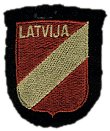A10 305 336
second floor window. She also admitted that Inspector Radlwker told her the name "Hazners" after she picked out his photograph (Tr. p. 5931). She was also very uncertain as to the format of the photographs she was shown (Tr. p. 5932, 5963, 6194). She did not remember whether the man wore a Latvian army uniform or a police uniform (Tr. p. 5575, 6136). She was certain that the man did not wear glasses (Tr. p. 6127). She was not even sure she was interviewed twice or three times (Tr. p. 6158) or whether she signed a statement at the American Consulate (Tr. p. 6539). She admitted that her testimony was a little mixed up in her head (Tr. p. 65410). She was also confused as to whether she saw photographs in New York or not, even though she had been there to testify only two weeks (Tr. p. 60311, 66012). The testimony of witness Noy also raises questions. There are discrepancies between his testimony and his prior statements on the date that the respondent allegedly made selections for extermination (Tr. p. 82213). He is the only witness who described the respondent as wearing an S.S. black coat and the skull and crossbones in the hat, the same as the ghetto commandant and his assistant (Tr. p. 71814, 76615, 76716).
The Service's contention that the respondent lied regarding his not being an S.S. volunteer is based on Exhibit 19 which was never introduced into the record (Tr. p. 1138-114017). 6/ Its contention that the respondent lied in his visa application (brief, p. 32) by failing to list his arrest by the Soviet security forces under question 32 is unwarranted. The respondent had been detained for a long time as a prisoner of war following the German defeat. His brief detention on June 25, 1941 was clearly a Soviet military action following the German invasion. It is clear that the visa application questions were in the context of criminal arrests, not military detentions. The Service's contention wrongly assumes that the Soviet forces were the legitimate government of Latvia. The same assumption underlies the Service's contention that the respondent lied by testifying that he was never a Nazi sympathizer, based only upon his military service against the Russians. The Soviet Union had overrun his native country, terminating its independence. A more reasonable explanation is to conclude that a Latvian could fight against the Soviet occupying forces without necessarily being a Nazi sympathizer.18 The United States has never accepted the legitimacy of the Soviet occupation of Latvia,
| 6/ | The testimony of Mr. Hartman casts doubts upon the designation "volunteer" in any such document. |
26
| 1 | Testimony of Chawa Ljak, 2-November-1977, direct, transcript pp. 576–604. |
| 2 | Testimony of Chawa Ljak, 2-November-1977, direct, transcript pp. 576–604. |
| 3 | Testimony of Chawa Ljak, 2-November-1977, direct, transcript pp. 576–604. |
| 4 | Testimony of Chawa Ljak, 2-November-1977, cross examination, transcript pp. 605–640. |
| 5 | Testimony of Shabtai Dolgizer, 1-November-1977, cross examination, transcript pp. 518–570. |
| 6 | Testimony of Chawa Ljak, 2-November-1977, cross examination, transcript pp. 605–640. |
| 7 | Testimony of Chawa Ljak, 2-November-1977, cross examination, transcript pp. 605–640. |
| 8 | Testimony of Chawa Ljak, 2-November-1977, cross examination, transcript pp. 605–640. |
| 9 | Testimony of Chawa Ljak, 3-November-1977, cross examination, transcript pp. 641–659. |
| 10 | Testimony of Chawa Ljak, 3-November-1977, cross examination, transcript pp. 641–659. |
| 11 | Testimony of Chawa Ljak, 2-November-1977, direct, transcript pp. 576–604. |
| 12 | Testimony of Chawa Ljak, 3-November-1977, cross examination, transcript pp. 641–659. |
| 13 | Testimony of Jacob Noy, 4-November-1977, cross examination, transcript pp. 763–830. |
| 14 | Testimony of Jacob Noy, 3-November-1977, direct, transcript pp. 692–756. |
| 15 | Testimony of Jacob Noy, 4-November-1977, cross examination, transcript pp. 763–830. |
| 16 | Testimony of Jacob Noy, 4-November-1977, cross examination, transcript pp. 763–830. |
| 17 | Testimony of Vilis A. Hazners, 9-March-1978, cross examination, transcript pp. 1061–1161. |
| 18 | The judicial review observes that "against the USSR" does not equate to "for Nazi Germany." |
